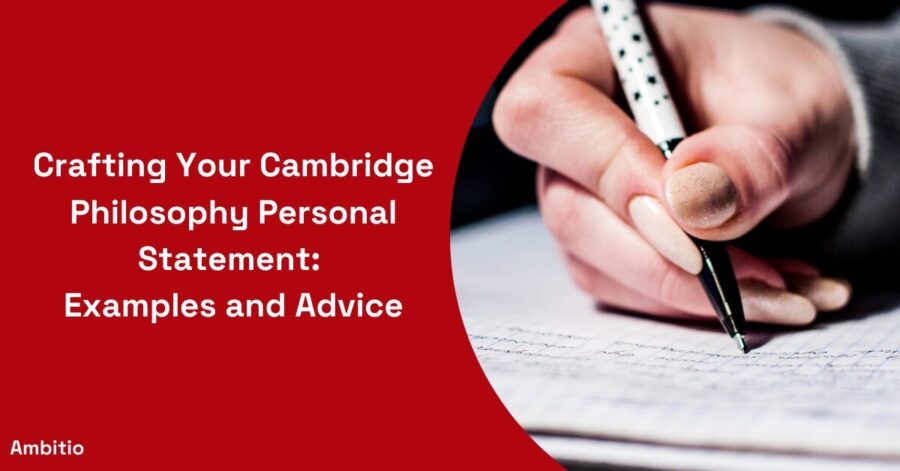12 December 2024
7 minutes read
Crafting Your Cambridge Philosophy Personal Statement: Examples and Advice

Introduction
Are you dreaming of studying philosophy at the world-renowned University of Cambridge? The journey to this prestigious institution begins with a well-crafted personal statement.
In this comprehensive guide, we will explore the intricacies of writing an exceptional Cambridge philosophy personal statement. We’ll provide you with valuable examples and expert advice to help you stand out in the competitive application process.
Understanding the Cambridge Philosophy Program
Before we dive into the nitty-gritty of personal statement writing, let’s first understand what makes the philosophy program at Cambridge so prestigious. Renowned for its academic excellence and distinguished faculty, Cambridge University sets high standards for its philosophy course. This program covers a wide range of philosophical topics, from the philosophy of mind to the basis of knowledge.
The Thirst for Knowledge: Your Motivation for Philosophy
Your personal statement should be a reflection of your genuine passion for philosophy. Admissions tutors are not just looking for applicants with a fleeting interest; they want individuals who have a deep-seated thirst for knowledge and a burning desire to explore difficult questions.
Share those moments that ignited your interest in philosophy – whether it was delving into a philosophical text, watching a thought-provoking documentary, or engaging in intense philosophical discussions.
Example: My Journey to Philosophy
I distinctly remember the day I picked up Descartes’ “Meditations on First Philosophy.” It was as if I had stumbled upon a treasure trove of profound ideas that would shape my academic journey. From that moment on, I was captivated by the questions that philosophy seeks to answer.
Showcasing Your Academic Excellence
Cambridge is known for its rigorous selection process, so you must demonstrate your academic prowess. Highlight your achievements in philosophy and related fields, such as mathematics and physics. Showcase your critical thinking skills and your ability to engage with complex philosophical issues.
Example: My Exploration of Philosophy and Mathematics
My academic journey has been marked by a relentless pursuit of knowledge. In addition to my passion for philosophy, I’ve excelled in mathematics, which I believe complements my philosophical pursuits. The interplay between logic and philosophy has always fascinated me, and I’ve consistently sought to bridge the gap between these two fields.
Tailoring Your Personal Statement to Cambridge
Every personal statement should be tailored to the specific university and course you’re applying for. In your Cambridge philosophy personal statement, mention why you want to study at Cambridge and how the university’s philosophy program aligns with your academic and intellectual goals.
Example: Why Cambridge?
Studying philosophy at Cambridge is not just a personal goal; it’s the culmination of years of dedication to the subject. Cambridge’s reputation for nurturing intellectual curiosity and fostering critical thinking aligns perfectly with my academic aspirations. The opportunity to learn from esteemed professors and engage in philosophical debates at Cambridge is an experience I eagerly anticipate.
Structuring Your Personal Statement
A well-structured personal statement is essential. It should flow logically, beginning with a captivating introduction that grabs the reader’s attention. Then, delve into your academic and extracurricular experiences, highlighting your passion for philosophy and showcasing your qualifications. Conclude with a strong closing statement that reinforces your motivation and commitment.
The Power of a Captivating Introduction
Your introduction is your first opportunity to make a lasting impression. It should be engaging and thought-provoking, drawing the reader into your narrative.
Example: An Opening That Sparks Curiosity
As I gazed into the depths of René Descartes’ meditations on the nature of reality, I felt a profound sense of wonder. Little did I know that this moment would mark the beginning of my lifelong philosophical journey.
Showcasing Your Journey
In this section, you’ll delve into your academic and extracurricular experiences. It’s where you narrate your journey through the world of philosophy, emphasizing significant milestones and accomplishments.
Example: My Academic Odyssey
Throughout my academic journey, I’ve eagerly embraced the challenges of philosophy. From my first foray into the “Problems of Philosophy” to my deep exploration of political theory, each step has fortified my passion for this discipline.
The Art of a Strong Conclusion
Your conclusion should leave a lasting impression. Reinforce your motivation for studying philosophy and express your unwavering commitment to the subject.
Example: Closing with Conviction
In closing, my passion for philosophy is not just a fleeting interest; it’s a lifelong pursuit of understanding the world and the intricate web of human thought. I am committed to contributing to the rich tapestry of philosophical discourse, and I believe that Cambridge is the ideal place for me to continue this journey.
Avoiding Jargon: Showcase Clarity
While philosophy can be complex, it’s essential to avoid excessive jargon in your personal statement. Write in simple, clear language to ensure your message is accessible and understandable to admissions tutors.
Example: The Clarity Conundrum
In my pursuit of philosophical excellence, I’ve always believed that the true test of understanding is the ability to explain complex ideas in simple language. It’s in this simplicity that we can engage a broader audience and foster a deeper appreciation for philosophical thought.
Seeking Expert Advice
Consider seeking guidance from philosophy tutors, teachers, or mentors who can provide valuable insights and feedback on your personal statement. They can help you refine your ideas and ensure your statement reflects your genuine passion for philosophy.
Example: The Mentorship That Shaped My Statement
I was fortunate to have an exceptional philosophy tutor who not only challenged my ideas but also nurtured my passion for the subject. Their guidance and unwavering support have been instrumental in shaping my personal statement and my academic journey.
Ace the Interview Process
The interview process at the University of Cambridge is a critical juncture in your journey to secure a spot in their prestigious philosophy program. It’s the opportunity to engage in intellectual discourse, showcase your passion for philosophy, and convince the admissions tutors that you are the right fit for their academic community. To ace this crucial phase of the application, let’s delve deeper into the interview process and explore strategies for success.
Understanding the Cambridge Interview
Cambridge interviews are known for their rigor and intellectual depth. They are designed to assess your ability to think critically, articulate your thoughts, and engage in meaningful philosophical discussions.
While the interviewers are keen to gauge your knowledge of philosophy, they are equally interested in your thought process, problem-solving skills, and your capacity to embrace new ideas.
Prepare Thoroughly
Before the interview, familiarize yourself with your personal statement and any philosophical texts or concepts you’ve mentioned. Review your academic achievements and be ready to discuss them. Be sure to read up on the specific interview format and requirements for your chosen college within Cambridge.
Example: Preparing for the Interview
In preparation for my Cambridge interview, I revisited my personal statement and reflected on the philosophical ideas I had highlighted. I also read and re-read the works of philosophers I admired, such as Bertrand Russell and René Descartes. Moreover, I researched the interview format for my chosen college, making sure I understood what to expect.
Practice Thoughtful Discussions
Cambridge interviews are not about memorizing facts or regurgitating information. They are about engaging in thoughtful, meaningful discussions. Practice discussing philosophical topics with peers, mentors, or teachers to hone your ability to articulate complex ideas clearly.
Example: Engaging in Mock Interviews
To refine my interview skills, I engaged in mock interviews with my philosophy tutor and fellow applicants. We tackled various philosophical questions and challenged each other’s arguments, simulating the interview experience as closely as possible.
Be Open to New Ideas
Cambridge interviewers may present you with unfamiliar philosophical problems or perspectives. Embrace these opportunities to showcase your adaptability and intellectual curiosity. Don’t be afraid to admit when you don’t know the answer; instead, use the opportunity to demonstrate your willingness to learn.
Example: Embracing the Unknown
During my Cambridge interview, I encountered a question that was entirely new to me. Rather than panicking, I acknowledged my lack of prior knowledge but enthusiastically engaged with the problem. I asked clarifying questions and shared my thought process as I worked through it. This demonstrated my commitment to intellectual exploration.
Confidence and Composure
Confidence is key during the interview process. Maintain composure, speak clearly, and back your arguments with evidence and logic. Remember, the interviewers are not seeking perfection but rather an authentic display of your passion and potential.
Example: Confidence in Action
During my interview, I maintained a calm and composed demeanor. Even when faced with challenging questions, I spoke confidently and provided reasoned responses. This confidence stemmed from my thorough preparation and my unwavering passion for philosophy.
Demonstrate Enthusiasm
Passion for philosophy should radiate from your every word and gesture. Share your love for the subject, discuss philosophical topics that genuinely excite you, and express your eagerness to contribute to the academic community at Cambridge.
Example: Passionate Expression
Throughout the interview, I couldn’t help but express my genuine enthusiasm for philosophy. I talked about my favorite philosophical texts, shared my excitement about specific courses at Cambridge, and conveyed my desire to engage with the philosophical community there. This unbridled enthusiasm left a positive impression on the interviewers.
Reflect and Learn
After the interview, take time to reflect on your performance. Regardless of the outcome, consider the interview as a valuable learning experience. Identify areas where you excelled and areas that may need improvement. This self-awareness will not only help you in future interviews but also in your philosophical journey.
Example: Post-Interview Reflection
After the interview, I reflected on the questions I found most challenging and areas where I could have improved my responses. This reflection guided my ongoing study of philosophy and my commitment to strengthening my weaknesses.
Conclusion
Crafting a successful Cambridge philosophy personal statement requires dedication and a genuine passion for the subject. By following the guidance provided in this extensive guide, seeking expert advice, and showcasing your unique perspective, you can maximize your chances of gaining admission to the esteemed University of Cambridge.
Your personal statement is your canvas to paint your philosophical journey and demonstrate your readiness for the challenges of academia. Remember, your statement is your voice in the application process, so make it resonate with your true passion for philosophy. Good luck on your academic journey!
Frequently Asked Questions
How long should my Cambridge philosophy personal statement be?
The UCAS guidelines recommend a maximum of 4,000 characters or 47 lines of text. This equates to about 500 words.
Can I mention other areas of study in my personal statement?
Yes, but ensure that your primary focus is on philosophy. You can briefly mention related fields if they contribute to your passion and motivation for philosophy.
What should I do if I haven’t studied philosophy extensively before?
Emphasize your genuine interest in philosophy and your willingness to learn. Discuss any relevant reading or extracurricular activities that have sparked your curiosity in the subject.
How important is spelling and grammar in my personal statement?
Spelling and grammar are crucial. Proofread your statement carefully to ensure it is error-free and polished.
Can I discuss philosophical issues that are not covered in my current studies?
Absolutely. Feel free to explore areas of philosophy that intrigue you, even if they are not part of your current academic curriculum.
What role does personal statement length play in the admission process?
While it’s important to adhere to the recommended length, the quality of your statement matters more than its length. Focus on conveying your passion, motivation, and qualifications effectively.
How can I demonstrate my commitment to philosophy in my personal statement?
Showcase your dedication by discussing your academic achievements, extracurricular activities related to philosophy, and moments that inspired your interest in the subject.
Is it necessary to include examples of philosophical texts or concepts in my personal statement?
Including references to philosophical texts or concepts can strengthen your statement, but it’s not mandatory. What’s most important is conveying your passion and motivation.

You can study at top universities worldwide!
Get expert tips and tricks to get into top universities with a free expert session.
Book Your Free 30-Minute Session Now! Book a call now




























